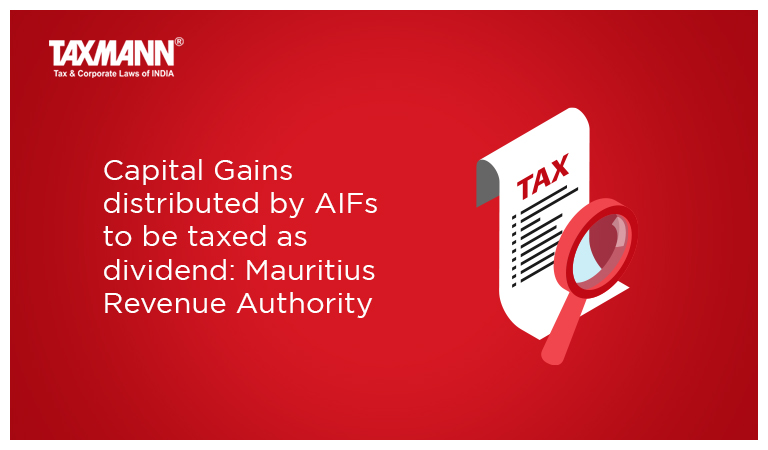Capital Gains distributed by AIFs to be taxed as dividend: Mauritius Revenue Authority
- Blog|International Tax|
- 3 Min Read
- By Taxmann
- |
- Last Updated on 4 July, 2022
Introduction
Mauritius Revenue Authority (MRA) has ruled that any income distributed by the Alternative Investment Funds (AIFs) incorporated in India to its unitholders in Mauritius will be treated as dividend income and, therefore, will not retain their initial characteristics.
Question
The Mauritius Revenue Authority (MRA) was questioned, “Whether capital gains distributed by Alternative Investment Funds (AIFs) incorporated in India to its unitholder, being an investment vehicle in Mauritius, would be considered as capital gains for income tax purposes?”
Response from MRA
The MRA in response to the said question rules that any income distributed by the Alternative Investment Funds (AIFs) incorporated in India to the investment vehicles in Mauritius will be treated as dividend income and, therefore, will not retain their initial characteristics. Thus, capital gains accrued to the AIF and distributed to the unitholder will be considered as a dividend in the hands of the unitholder and not the capital gains for income tax purposes.
Impact of MRA’s ruling
Alternative Investment Funds (AIFs) are the funds incorporated in India that collect money from Indian or foreign investors and invest it in accordance with a defined investment policy.
AIFs are classified under 3 categories; Category-I, Category-II, and Category-III. The taxability of investment made by a person in AIFs depends upon the category of AIF.
Category-I and Category-II AIF are provided pass-through status under the Indian income-tax laws whereby income (other than the income chargeable under the head business or profession) arising to such funds is exempted from tax in their hands, while unitholders of such funds are liable to pay tax on such income as if the income has been earned by them directly. Thus, the income paid or credited or deemed to be credited by Category-I and Category-II AIF to their unitholders shall be deemed to be of the same nature and in the same proportion in the hands of the unitholder as if it had been received by, or had accrued or arisen to, the AIF.
Unlike Category-I and Category-II AIF, Category-III AIF is not provided pass-through status under the Indian income-tax laws. Thus, the income of Category-III AIF is taxable in its own hands. Further, when it distributes income to its unitholders, the unitholder is also liable to pay tax thereon except where the Category-III AIF is located in International Financial Services Centre (IFSC) and it’s all the units are held by non- residents (except the sponsor or manager).
A Mauritian entity is liable to pay tax to the Mauritius Government in respect of dividend or interest earned from investment in India. However, the capital gain arising from investment in India is exempt from tax in Mauritius.
As MRA has ruled that any income distributed by AIF to its unitholder will be considered as dividend income, it would impact Mauritian investors who have invested in Category-I or Category-II AIF.
Category-I and Category-II AIF are provided pass-through status under the Indian income-tax laws and income distributed by such funds to their unitholders is deemed to be of the same nature as in the hands of such fund. Thus, if the income distributed by such AIF is of the nature of a dividend then the same is taxed as a dividend in the hands of its unitholders. Similarly, if the nature of distributed income is capital gain then the same is taxed as capital gain in hands of the unitholder. However, as per the MRA ruling, all income distributed by AIF to its unitholder will be treated as dividend income. Thus, even if the nature of income distributed by AIF to its unitholder is capital gain, the same would now be taxed in Mauritius just like a dividend.
Ruling not applicable to fiscally transparent entity
The MRA vide Communique dated 01-07-2022 has clarified that income which is distributed by a foreign fiscally transparent entity shall retain its initial character in Mauritius.
Accordingly, any capital gains eventually distributed by a foreign fiscally transparent entity to a Mauritian resident shall be treated as capital gains and are not subject to income tax in Mauritius.
Read the Ruling
Read the Communique
Disclaimer: The content/information published on the website is only for general information of the user and shall not be construed as legal advice. While the Taxmann has exercised reasonable efforts to ensure the veracity of information/content published, Taxmann shall be under no liability in any manner whatsoever for incorrect information, if any.

Taxmann Publications has a dedicated in-house Research & Editorial Team. This team consists of a team of Chartered Accountants, Company Secretaries, and Lawyers. This team works under the guidance and supervision of editor-in-chief Mr Rakesh Bhargava.
The Research and Editorial Team is responsible for developing reliable and accurate content for the readers. The team follows the six-sigma approach to achieve the benchmark of zero error in its publications and research platforms. The team ensures that the following publication guidelines are thoroughly followed while developing the content:
- The statutory material is obtained only from the authorized and reliable sources
- All the latest developments in the judicial and legislative fields are covered
- Prepare the analytical write-ups on current, controversial, and important issues to help the readers to understand the concept and its implications
- Every content published by Taxmann is complete, accurate and lucid
- All evidence-based statements are supported with proper reference to Section, Circular No., Notification No. or citations
- The golden rules of grammar, style and consistency are thoroughly followed
- Font and size that’s easy to read and remain consistent across all imprint and digital publications are applied




 CA | CS | CMA
CA | CS | CMA
